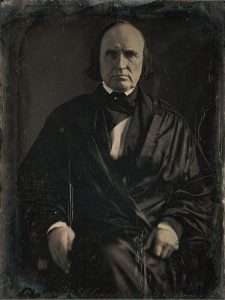The Volokh Conspiracy
Mostly law professors | Sometimes contrarian | Often libertarian | Always independent
Today in Supreme Court History: January 11, 1830
1/11/1830: Justice John McLean takes oath.

Editor's Note: We invite comments and request that they be civil and on-topic. We do not moderate or assume any responsibility for comments, which are owned by the readers who post them. Comments do not represent the views of Reason.com or Reason Foundation. We reserve the right to delete any comment for any reason at any time. Comments may only be edited within 5 minutes of posting. Report abuses.
Please to post comments


One of two dissenting Justices in Dred Scott v. Sandford.
A rather remarkable fellow, probably most remembered as one of two dissenters in the Dred Scott, I recently lost out on eBay bidding on an 1814 letter by then-Congressman McLean to Secretary of the Navy William Jones, vouching for a young man seeking an appointment as a midshipman. (This was before the establishment of the Naval Academy in 1845, and "midshipman" was a warrant officer-level rank, appointed directly by the president. The young man in question would indeed receive his appointment, eventually rising to the rank of commander.)
McLean was the very first representative for Ohio's 1st congressional district, elected in 1812 and re-elected in 1814. He would resign to accept an associate justice position on the Ohio Supreme Court, on which he would serve from 1816 to 1822. (He was succeeded in Congress by future president William Henry Harrison).
Unfortunately, the decisions of the Ohio Supreme Court were not officially reported until 1824, though were sometimes reported in newspapers. McLean seems to have made quite an impression, and, I believe, remains the only member of the Ohio Supreme Court to later serve on the US Supreme Court. In 1817, he wrote an opinion in the case of State v. Carneal which involved a slave named Richard Lunsford who was owned by Kentucky resident Thomas Carneal, who frequently sent Lunsford to work in Ohio, where slavery was prohibited by the state constitution. Lunsford argued that his frequent presence in Ohio rendered him a free man. This was the same issue the US Supreme Court would address in Dred Scott forty years later. The Ohio court rule for Lundsford, declaring him a free man, but on other grounds. In his opinion, McLean would write:
Justice McLean would receive votes at the 1848 Whig National Convention (which would nominate eventual election winner Zachary Taylor), would finish second to John C. Fremont at the 1856 Republican National Convention, and would receive votes at the 1860 Republican National Convention (which would nominate Abraham Lincoln).
Interesting stuff, thanks! Silly me, I thought maybe he was the guy from Die Hard.